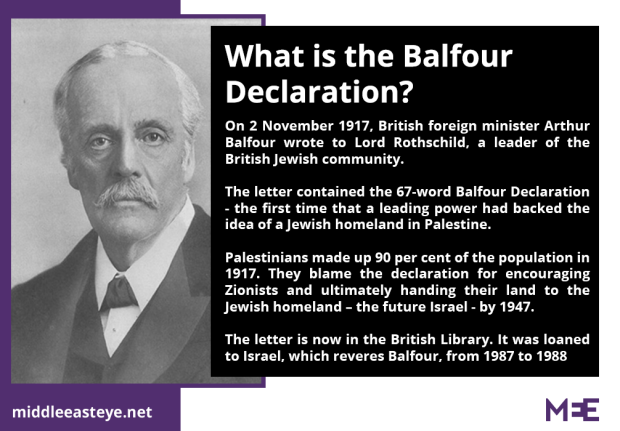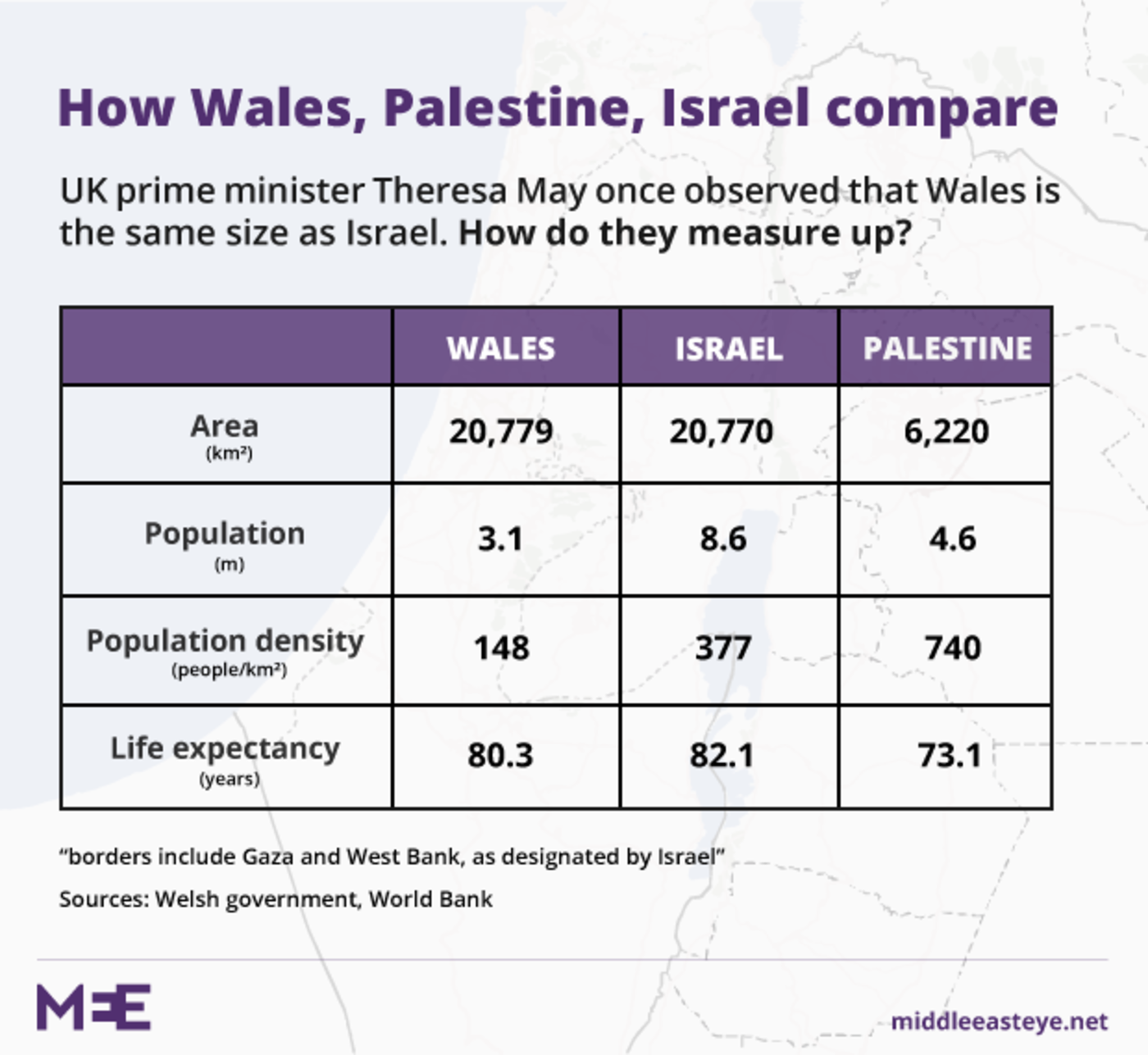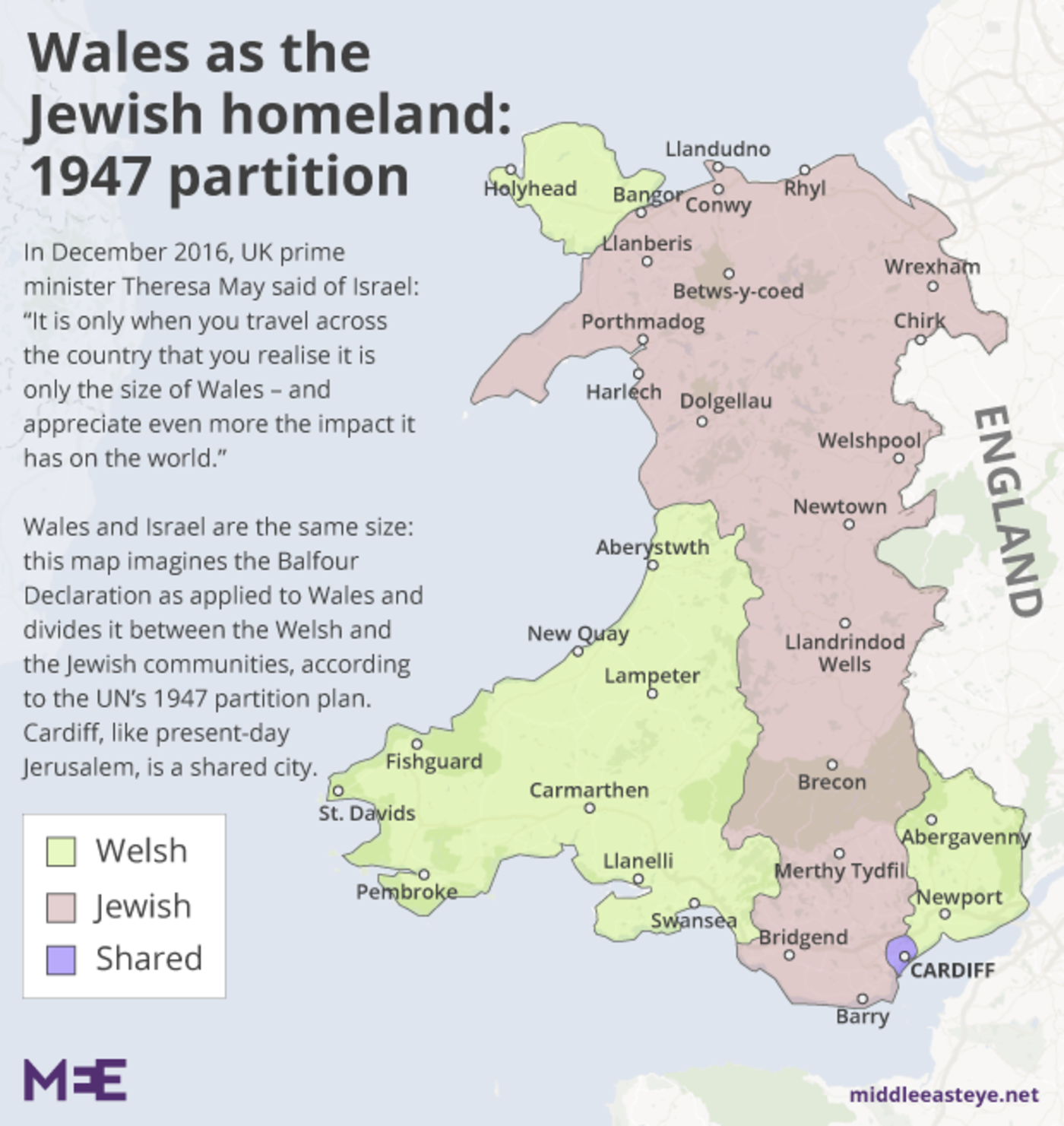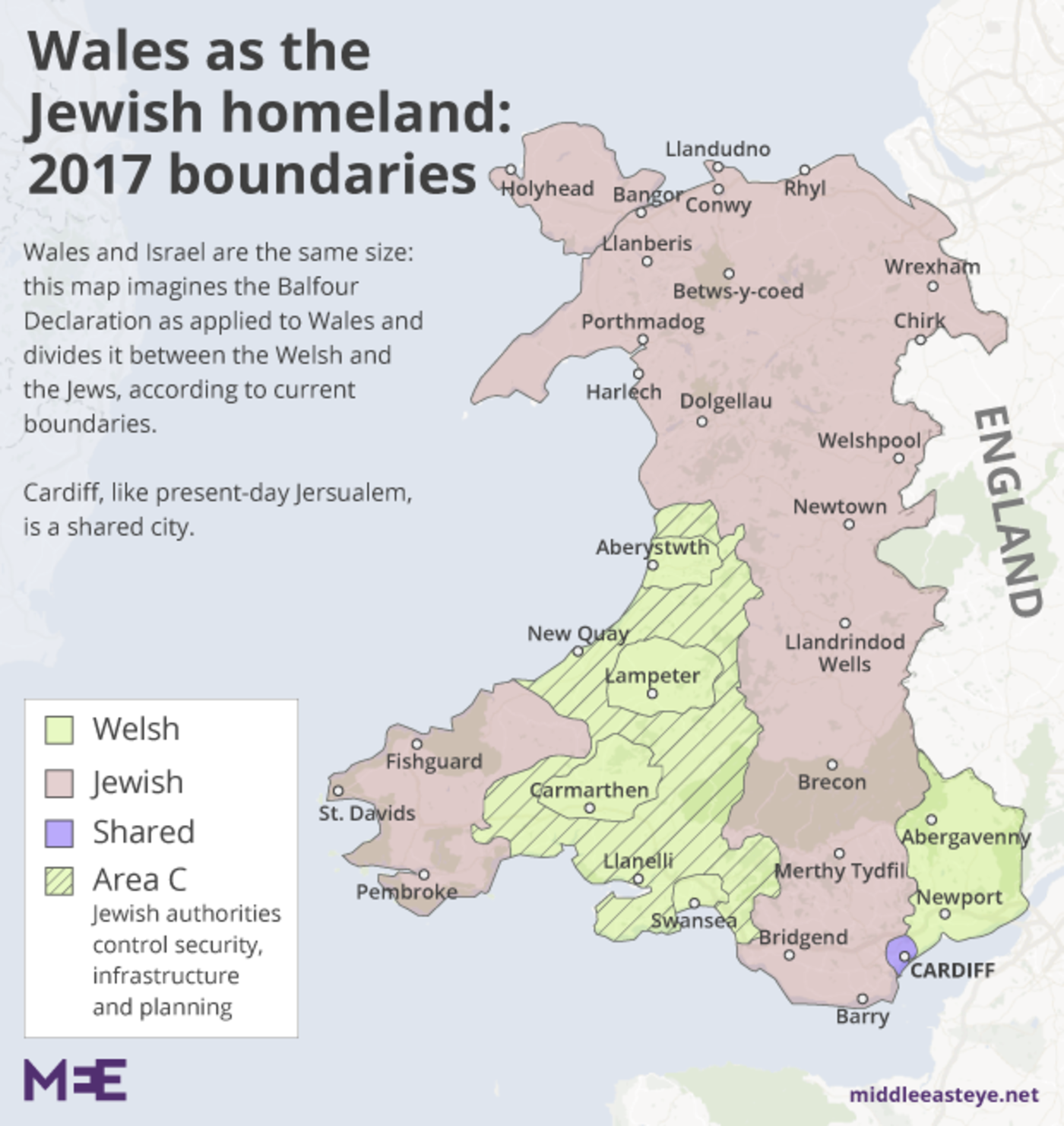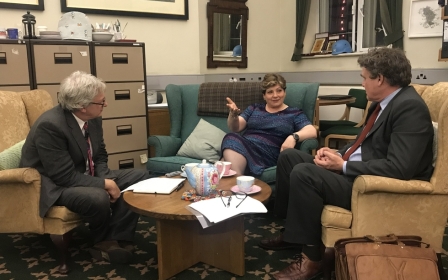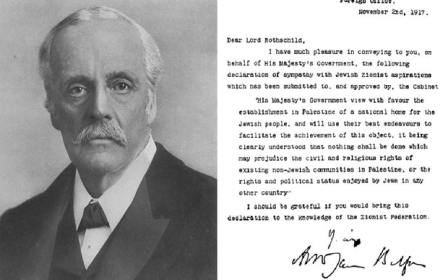After the Nakba: What if Wales had been offered to the Jews as a homeland?
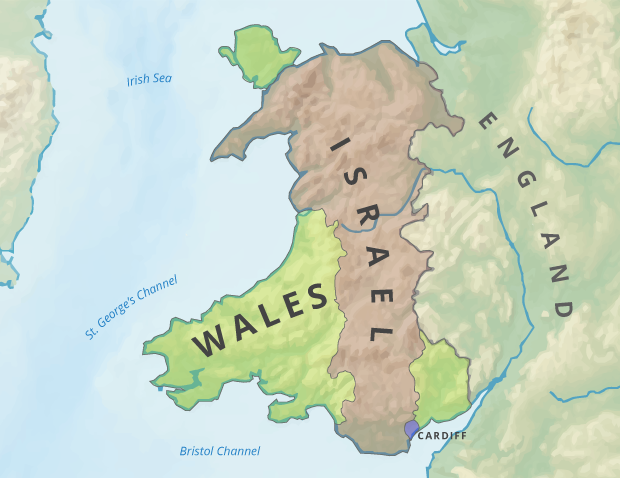
On 2 November 1917, British Foreign Secretary Arthur Balfour sent a letter to Lord Walter Rothschild, a prominent Zionist, which became known as the Balfour Declaration.
In it, the British government promised Palestine to the Zionists - and did so without consulting Palestinians, British Jews, or the wider British population. While Palestinian Arabs at the time made up 90 per cent of the territory's 700,000 population, they were bizarrely only referred to as "existing non-Jewish communities". The letter also said "that nothing should be done to prejudice" their "civil and religious rights".
The declaration had a catastrophic impact on the Palestinians. It eventually led to the creation of Israel in 1948, during which Palestinians were driven from their homes, mostly through Jewish acts of terror.
The least the Palestinians might expect on the 100th anniversary from the British would be some remorse and an apology. But Theresa May's government has not only refused to apologise on behalf of the UK, it is also planning to "mark it with pride" as she told the pro-Israel lobby group Conservative Friends of Israel in December 2016.
New MEE newsletter: Jerusalem Dispatch
Sign up to get the latest insights and analysis on Israel-Palestine, alongside Turkey Unpacked and other MEE newsletters
This week she will be joined in London by Israeli Prime Minister Benjamin Netanyahu as they mark the centenary alongside pro-Israel groups.
Britain had no right to offer Palestine to the Zionists. The claim that Jews have a perpetual right to live there is rejected by Palestinians. Do all Muslims have a right to "return" to Saudi Arabia? And what about a Christian "right of return" to Palestine? Israel is seen as a democracy by its supporters - but many others see it as a colonialist settler state.
What if Balfour offered Wales to the Zionists?
If we assume that London wanted in 1917 to help a persecuted people find sanctuary, then surely it could have offered the Zionists a homeland in a territory that it controlled at the time?
They say that charity begins at home. David Lloyd George, a proud Welshman, was British prime minister at the time of the declaration. What if the Balfour Declaration had read: "His Majesty's Government view with favour the establishment in Wales of a national home for the Jewish people"?
Present day Wales covers 20,779 sq km. Israel, the West Bank and the Gaza Strip covers 20,770 sq km.
The population of Wales in 1917 would have been around 2.5 million while that of Palestine was around 1 million (Jews made up less than 10 percent of that number).
Had Balfour offered Wales to the Zionists, it is safe to say that the Welsh would have rejected the declaration. Jews, though disappointed at failing to obtain Palestine, would soon have started arriving to settle the land.
There would likely have been tensions between the two groups. London would have tried to keep the peace but would likely have failed, especially given the ongoing fight in Ireland - which the British also controlled - for independence.
Does anyone believe the Welsh would have agreed to give up any inch of their homeland to the Zionists? Or would they have resisted, including through armed struggle?
The Zionists would have set up armed militias to fight the Welsh. More and more Jews would have arrived in Wales during the early 1940s. The United Nations would then intervene in Wales, as it did in Palestine, and offer a partition plan that gave Jews 56 percent of the land, leaving the indigenous Welsh with only 44 percent.
Does anyone believe the Welsh would have agreed to give up an inch of their homeland to the Zionists? Or would they have resisted, including through armed struggle?
In 1948, the Zionists would declare their independence and establish Israel as a state. They would also start the process of expanding their hold on Wales. Welsh villages would be destroyed. Some two million Welsh refugees would flee to England, Scotland and Ireland. Some would even make it to France and Spain.
When the guns fell silent, Israel would extend the area of the former Wales that it occupies to 78 percent, well beyond that of the partition plan. The UN would issue a resolution calling on Israel to allow refugees to return - but Israel would refuse.
The world would call for a two-state solution in which Israel and Wales would live side by side, with Cardiff as a shared capital. In 1967, Israel would attack the Irish and the Scots, who would try to help the Welsh resistance regain their occupied land. Eventually Israel would capture the whole of Wales and declare Cardiff as its eternal, united capital. More Welsh would be expelled to neighbouring countries such as Ireland.
For "security’ reasons" Israel would begin to build settlements for Jews in occupied Wales, near population centres such as Swansea. It would make it increasingly difficult for a two-state solution to be realised. Abandoned by the international community and seeing their land eroded further, the Welsh would start a gwrthryfel Cymreig (the Welsh uprising, or intifada) in 1987, which would be suppressed by Israel by 1991.
In 1993, secret talks in Finland between the Welsh and the Israelis would result in the Helsinki Accords. The Welsh Liberation Organisation (WLO) would recognise Israel - but Israel would only recognises the (WLO) as the "sole representative of the Welsh people".
Resistance from the Gwent Strip
There would be no genuine move towards peace, planned to lead to a viable Welsh state by 1998. Instead Israel would increase its settlement enterprise and divide the occupied Welsh territories – including much of the former county of Dyfed - into areas A, B and C.
The Gwent Strip is particularly problematic and becomes a hub of resistance
Israel would link the settlements in the occupied Welsh territories to each other and to Israel. It would apply military law to the Welsh but civil Israeli law to the illegal Jewish settlers.
The Welsh would see no end to their occupation. A second gwrthryfel would erupt in 2000. This time it would be more violent. The Welsh would be accused of being terrorists.
Israel would build a wall deep inside occupied Welsh areas, including Gwent, and increase the number of checkpoints to limit the movement of people, animals and goods. It would also capture most of the water resources and sell them to the Welsh at inflated prices.
The Gwent Strip would be particularly problematic and become a hub of resistance. Israel would decide to remove its settlers and then lay siege to the territory, a siege which would last to this day.
In Israel itself, Welsh citizens would be treated as second-class, subject to 60 discriminatory laws. They would be able participate in Israel's democracy - but it would really be a democracy for Jews only.
In Cardiff, Israel would manipulate the population demographics to ensure that there was always a Jewish majority. The Welsh would be frustrated by a planning system which would not allow them to build houses in occupied Cardiff.
Eventually some would build homes without permission, only for the Israeli authorities to demolish their homes. The state would revoke their "residency" permits if they judge Cardiff not to be their "centre of life".
The Welsh would not be allowed access to an airport or a seaport. To travel abroad they would have to use the border crossing into England and then fly from Bristol or Birmingham.
The Welsh catastrophe
And in the Middle East? Despite earlier Zionist wishes, Palestine was never promised as a Jewish homeland. Instead an independent Palestinian Arab state was established when the British mandate ended there in 1947.
Its capital is Jerusalem, where Muslims, Jews and Christians live happily to this day. The city has its own Welsh Solidarity Campaign, which works to support the legitimate rights of the Welsh people.
On 2 November 2017, in this alternative future, London will celebrate the centenary of the Welsh Balfour Declaration "with pride".
But the British prime minister will refuse to apologise to the Welsh for London's role in their dispossession and subsequent trychineb (the Welsh word for "catastrophe").
Will the Welsh in the occupied territories likewise be celebrating?
- Kamel Hawwash is a British-Palestinian engineering professor based at the University of Birmingham and a longstanding campaigner for justice, especially for the Palestinian people. He is vice chair of the British Palestinian Policy Council (BPPC) and a member of the Executive Committee of the Palestine Solidarity Campaign (PSC). He appears regularly in the media as commentator on Middle East issues. He runs a blog at www.kamelhawwash.com and tw
The views expressed in this article belong to the author and do not necessarily reflect the editorial policy of Middle East Eye.
This article is available in French on Middle East Eye French edition.
Middle East Eye delivers independent and unrivalled coverage and analysis of the Middle East, North Africa and beyond. To learn more about republishing this content and the associated fees, please fill out this form. More about MEE can be found here.



